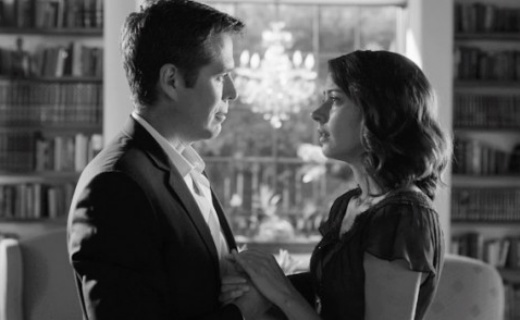Directed by Joss Whedon
Written by Joss Whedon
USA, 2012
Spending two hours in the world of Joss Whedon’s Much Ado About Nothing inspires envy in his seemingly palatial abode, as well as delight at his effortless, carefree adaptation of an equally effortless and carefree Shakespearean comedy. There’s mistaken identity, slapstick, swooning romance, and giddy farce, as you would expect from any revival, modern or otherwise. The joy this time comes in seeing how naturally Whedon is able to refashion the familiar tale to the present day, and in seeing a number of actors from his stable of TV performers bounce off each other.
As in the original tale, the story begins at Leonato’s manse, as he’s visited by Don Pedro as well as Pedro’s friends Claudio & Benedick and his disgraced brother Don Jon. Claudio, almost instantly, has his eye on Leonato’s comely daughter Hero. Meanwhile, Benedick can’t hold himself from verbally sparring with Leonato’s niece, Beatrice, who happens to be his former lover. Romantic complications arise almost instantly, as Beatrice and Benedick are pushed into the love they’re only willing to cop to once they overhear everyone else talking about it, and as Claudio pursues Hero with surprising results. But the romantic roundelay is something of a backdrop, as the ensemble does honor to the Bard’s words, which may seem at odds with present-day trappings like modern music or cell-phone videos, but the old and new blend quite nicely.
Anyone who’s even moderately familiar with the Whedonverse, with cult shows like Buffy the Vampire Slayer, Firefly, and Dollhouse, may get an extra kick of pleasure from seeing Wesley Wyndham-Pryce, Mal Reynolds, and Topher Brink interacting in such playful fashion in this movie. For the uninitiated, the performers may only strike a vague air of recognition—those who haven’t seen any of Whedon’s shows may recognize Clark Gregg, as Leonato, more than anyone else thanks to his work in Marvel’s superhero movies—but all are capable and charming in their roles. The clear standout, as she has been in so many of Whedon’s previous works, is Amy Acker. Her Beatrice is fierce and witty, manufacturing a vicious veneer to mask the feelings she harbors for Benedick from their past tryst. Alexis Denisof is far from his overly fussy Wesley on Angel as Benedick, a smug, overly arrogant sort who crows about being a bachelor. We, of course, know he’ll change his tune quickly, and the way Denisof plays the rapid shift is the source of a lot of the film’s humor. The scene in which Benedick overhears Claudio, Leonato, and Don Pedro discussing Beatrice’s purported feelings for him is a high point, for Denisof, scrambling to be hidden, and the film as a whole.
Aside from Denisof and Acker, it’s hard to choose more members of the ensemble to highlight, as so many get at least one moment to impress. Fran Kranz, perhaps best known as the surprisingly shrewd pothead in The Cabin in the Woods, gets an opportunity to be the more strait-laced (if, in this case, a bit too honor-bound) romantic lead, and is a puppy-love counterbalance to Benedick’s strident refusal, at first, to admit he wants to indulge in the institution of marriage. And then, in the most comic of parts, there’s Nathan Fillion as the bumbling constable Dogberry. Once the law is brought into the tale, things turn a bit dark, but that’s where Fillion—blustery as ever, always trying to assert himself as a respectable tough guy—fits in, as a welcome bit of relief.
One notable aspect of this Much Ado About Nothing is its brief production; filming only took 12 days and was done in black-and-white, all at Whedon’s seemingly huge house. There’s rarely a moment, though, when Much Ado About Nothing looks cheap; any cost-cutting efforts are minimal at best. (It helps matters that, seriously, the house in question is as fancy and lush as the characters who populate it.) If anything, there’s an immediacy to the proceedings that almost fools one into thinking this is just an elaborate, week-long dinner party where the wine won’t stop flowing as long as you hold out a glass. Even when Don Pedro’s brother Don Jon (Sean Maher, sufficiently odious) and his two lieutenants are scheming, this world is so fun you want to jump through the screen to join in on the party.
And a party is exactly what this Much Ado About Nothing is, a joyous, infectious experience that you’re heartbroken to see come to a close. Of course, as it always goes with Shakespeare’s comedies, there’s happy endings all around, but even before the couples arrive at their happily ever after, this movie is as gleeful and exciting as anything Joss Whedon’s ever done. His choices in adapting the story to the modern day, as well as in who plays which part, all hit the bullseye. Few things in modern cinema are as enjoyable to behold as a group of performers having the time of their lives, and so it is that this Much Ado About Nothing is exceptionally delightful.
— Josh Spiegel




